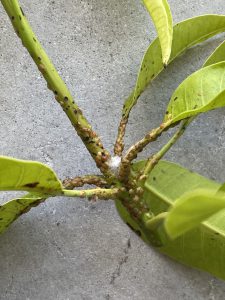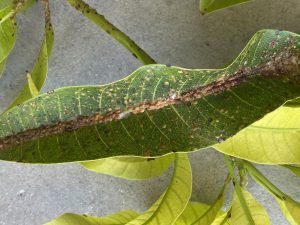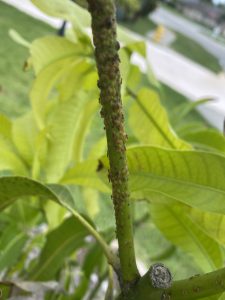The photo below and above show a pretty significant infestation of soft scale on a mango tree in Collier County.

Scales are stationary, shell-like insects that can damage trees by feeding on the sap in branches, leaves and fruit and release poison into the tree. There are several species of soft scales that can show up on your mango tree in Florida. The ones pictured are likely brown soft scale. When you have a heavily infested area, the leaves can turn pale green or yellow and will ultimately die. With scale you may also see sooty mold due to honeydew secretion on the plant.

Mangoes are resilient trees, so even though they are subject to attack by several insects, the population levels are generally not high enough to be considered pests or even impact fruit production. However, sometimes an infestation occurs that justifies a reaction.

So what can you do?
Beneficial insects are an important part of integrated pest management (IPM). There are beneficial insects such as ladybugs and lacewing that are natural predators of young crawlers. Scales can also be parasitized by small wasps. Creating the right habitat to encourage beneficial insects and learning what beneficial insects look like can help.
It may also be a good idea to prune back the tree to decrease scale population and actually remove the scales in the process. This can also open up the canopy to sunlight.
Spraying mineral oil is effective to control scale, too. Use of systemic pesticides or chemical control is warranted if there is significant live scale activity. Always follow the label to apply correctly.
For more information check out: ENY-413/IG073: Mango Pests and Beneficial Insects (ufl.edu)
 0
0
